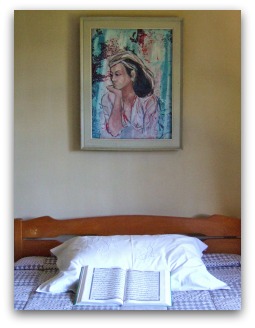 A website for foreigners coming to live in Indonesia warns about the downside of the Muslim fasting month of Ramadan. These include sluggish performance by local office and domestic staff, louder and more frequent broadcasts from mosques, interrupted sleep and closure of some restaurants at lunchtime. Having recently spent some of Ramadan in Bandung, I have a slightly different take on the holiest month in the Indonesian calendar.
A website for foreigners coming to live in Indonesia warns about the downside of the Muslim fasting month of Ramadan. These include sluggish performance by local office and domestic staff, louder and more frequent broadcasts from mosques, interrupted sleep and closure of some restaurants at lunchtime. Having recently spent some of Ramadan in Bandung, I have a slightly different take on the holiest month in the Indonesian calendar.
My temporary home was situated on a hillside overlooking a narrow valley that is home to more than the usual quota of mosques. The valley amplifies the calls to prayer so that they are heard louder by those above. But being repetitive, the sound soon becames a familiar, even comforting, part of the landscape, like the train that passes at regular intervals or the grandfather clock that chimes deep in the night down the hallway.
My elevated position allowed me to tune in to the muazzin calls and adjudicate their different talents. One was hauntingly beautiful. He could project his call, then truncate the note in mid cry to leave it hanging over the valley like an exclamation mark. I imagined him, head up, listening to the effect like Andrea Bocelli.
The starting date for this year's holy month was, as usual, a matter of some debate. Some insisted it begin when the crescent moon was seen by the naked eye above the horizon following the new moon. Others, encouraged by pollution, weather and the obstruction of modern high-rise buildings, simply referred to the lunar calendar.
Teams of public servants were dispatched by the Minister of Religion to consult and monitor. True believers used telescopes to survey the horizon, and anyone who claimed a sighting got on telly. In between the latest on Syria, soccer results and news from the stock exchange, the news ticker reported few sightings of the crescent moon.
The Minister stepped in to resolve the matter. After listening patiently to learned arguments during a long televised conference with Muslim leaders, he pronounced in favour of 21 July.
The fasting month involves a good measure of self-maintenance, but it is not about self-flagellation or wearing sackcloth and ashes. It's equally about family, community, compassion, looking after the poor, and ethical behaviour in business etc. (a way to go there).
I got very good marks from a taxi driver (mind you after he'd effectively ripped me off by claiming his meter was rusak) for donating to a mother and child who approached our car. When I said it was zakat (the charity expected at this time) he asked if I was Muslim. He laughed when I said no though I had fasted since lunch time.
The fasting rule is interpreted flexibly. Many exemptions apply. You are free not to fast if you have to travel a certain distance (30km or similar), are pregnant, breastfeeding, old, little, sick, or basically have a good excuse (like Muslim athletes at the London Olympics or Bachar Houli on a Saturday).
When I told a Muslim friend that Garuda flights to Melbourne were fully booked, he suggested it might be Muslims heading to Melbourne to fast because it's winter there and the days are shorter!
Fasting makes you hungry and can focus the mind on food and matters material rather than liberate. Ironically, Ramadan can also involve an enormous amount of planning, cooking, shopping, late night and pre-dawn binges. Households buy up. Restaurants and hotels offer discount meal packages.
One hotel lobby I visited was decked out like Mecca. Plastic date palms waved under the A/C around a large green-domed mosque sculpted out of foam; hijabers thronged; the lift doors were adorned like entrances to a Mosque and, mercifully, the karaoke had been shut down for the month (thank you Muhammad).
It is also a time of serious devotion. My young colleague, a professional, stopped to pray during the day as naturally as texting or having a coffee. My host, a retired professor in his mid-70s, rose around 4am to pray.
As thanks for his hospitality I gave him a framed image of a man at prayer. It was an apposite gift to make at this time. Ramadan celebrates the period when Allah revealed the Koran and the calligraphy that forms the image, I was told, is a sentence in Arabic from the holy book.
I refrained from drinking red wine while in Indonesia. Given my culture, where the fruit of the vine enjoys considerable status, including medicinally and sacramentally, this might seem heroic, even unthinkable, like asking an Indonesian go to without rice for a month.
My abstinence was due more to circumstance than virtue. But I have to admit it was good for me. I have Ramadan 1433 to thank for that too.
 Pat Walsh AM is a human rights advocate and author who has recently returned to Australia from working on reconciliation issues in Timor-Leste. He has recently published At the Scene of the Crime: essays, reflections and poetry on East Timor, 1999-2010.
Pat Walsh AM is a human rights advocate and author who has recently returned to Australia from working on reconciliation issues in Timor-Leste. He has recently published At the Scene of the Crime: essays, reflections and poetry on East Timor, 1999-2010.